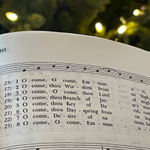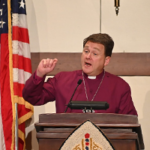This website uses cookies so that we can provide you with the best user experience possible. Cookie information is stored in your browser and performs functions such as recognising you when you return to our website and helping our team to understand which sections of the website you find most interesting and useful.
“The text of O come, O come, Emmanuel is based on the O Antiphons, which were part of the Roman rite’s monastic vespers during the last week of Advent. Each verse begins with a call out to Christ by one of his titles in scripture (O come, Emmanuel; O come, Wisdom from on high, etc…)”
by Michael Redmond
Advent is a season of reflection and hope, opening the church’s liturgical year by preparing for the coming of Christ in various senses — at Bethlehem, within the believer’s heart, and in majesty on the Last Day. We focus on the promise of Christ made through the prophets long ago; on that promise already fulfilled in the life, death, and resurrection of the Lord Jesus and on that promise still be to be fulfilled at the Second Coming.
The church observes Advent by special readings and practices, including Advent wreaths and calendars, evensong, and the service of Nine Lessons and Carols; the church also encourages believers to incorporate Advent into their daily prayer life during the season’s four weeks. One way of doing so spotlights one of the most popular hymns of the season, O come, O come, Emmanuel (No. 56, The Hymnal 1982). The Latin hymn has a fascinating history, and its verses, adapted by the prolific hymnographer John Mason Neale (1818 – 1866), offer a day-by-day template for reflection. One may sing each day’s verse, of course, or simply say it as the day’s Advent prayer.
The text of O come, O come, Emmanuel is based on the O Antiphons, which were part of the Roman rite’s monastic vespers during the last week of Advent. Each verse begins with a call out to Christ by one of his titles in scripture (O come, Emmanuel; O come, Wisdom from on high, etc.), and most end with a petition for some grace or blessing. The language of each verse is rich with scriptural allusion, particularly from the prophet Isaiah. One can pray this hymn one verse a day. The following is their order in Neale’s adaptation.
O come, O come, Emmanuel, and ransom captive Israel, that mourns in lonely exile here until the Son of God appear. Rejoice! Rejoice! Emmanuel shall come to thee, O Israel. (Isa. 7:14; Mal. 3:1; Mt. 1:21−23).
O come, thou Wisdom from on high, who orderest all things mightily; to us the path of knowledge show, and teach us in her ways to go. Rejoice! Rejoice! Emmanuel shall come to thee, O Israel. (Isa. 11:2−3; Wis. 8:1; Prov. 9:1)
O come, thou Rod of Jesse, free thine own from Satan’s tyranny; from depths of hell thy people save, and give them victory o’er the grave. Rejoice! Rejoice! Emmanuel shall come to thee, O Israel. (Isa. 11:1−4; 45:23; 52:13; Luke 1:32−33)
O come, thou Dayspring, come and cheer our spirits by thine advent here; disperse the gloomy clouds of night, and death’s dark shadows put to flight. Rejoice! Rejoice! Emmanuel shall come to thee, O Israel. (Mal. 3:20; Isa. 9:1; Ps. 107:14)
O come, thou Key of David, come, and open wide our heavenly home; make safe the way that leads on high, and close the path to misery. Rejoice! Rejoice! Emmanuel shall come to thee, O Israel. (Isa. 22:22; 42:6−7; Luke 4:16−19)
O come, O come, great Lord of might, who to thy tribes on Sinai’s height in ancient times once gave the law in cloud and majesty and awe. Rejoice! Rejoice! Emmanuel shall come to thee, O Israel. (Ex. 3:1−8; 20:1−20; Deut. 26:5−9)
O come, thou Root of Jesse’s tree, an ensign of thy people be; before thee rulers silent fall; all peoples on thy mercy call. Rejoice! Rejoice! Emmanuel shall come to thee, O Israel. (Isa. 11:1−4; 45:23; 52:13; Luke 1:32−33)
O come, Desire of nations, bind in one the hearts of all mankind; bid thou our sad divisions cease, and be thyself our King of Peace. Rejoice! Rejoice! Emmanuel shall come to thee, O Israel. (Isa. 28:16; Gen. 2:7; Mt. 21:42; 1 Peter 2:4−5)
The O Antiphons are among the most ancient texts we have from the Western monastic office. The Christian philosopher Boethius refers to them while writing in the sixth century. As for the plainchant tune of O come, O come, Emmanuel, its earliest provenance is a 15th century French processional, although it is likely older. Many composers of note have set the O Antiphons to music, including Carlo Gesualdo and Ralph Vaughan Williams, and in our own day, Peter Hallock, Healey Willan, and James MacMillan.
A commentary on AnglicanOnline.org, reads, “ … in addition to bringing together Hebrew prophecies about the coming of the Christ Child, the antiphons include a substantial pre-Christmas wish-list. When we pray them, we ask — not always disguising our impatience very well — for instruction in the way of prudence; for redemption with an outstretched arm; for deliverance; for the release of prisoners out of the prison house; for enlightenment and for salvation.
“The Os pull together the Church’s voice of prayer in supplication for prophetic and apocalyptic intangibles. And still, when we are finished praying them, we must wait a little more. Waiting becomes a positive good in the Os, a thing to be undertaken and even enjoyed not for its own sake, but for the sake of the One to be born at the end of the waiting.”
O Come, O Come, Emmanuel first appeared in Neale’s Medieval Hymns and Sequences (1851). Neale’s adaptation was included in the Church of England’s official hymnal in 1861 and quickly found a place in many Protestant hymnals.
On the web:
* O Come, O Come, Emmanuel: https://www.youtube.com/watch?v=7xtpJ4Q_Q-4
* The Great Advent Antiphons (plainchant with accompaniment): https://www.youtube.com/watch?v=hhK_SjfMDX4
* About John Mason Neale: http://satucket.com/lectionary/JMNeale.htm

A versatile editor and writer with an extensive background in daily journalism, Michael Redmond, is a regular contributor to the Delaware Communion and a member of the diocesan communications team.
mr@michaelredmond.net






